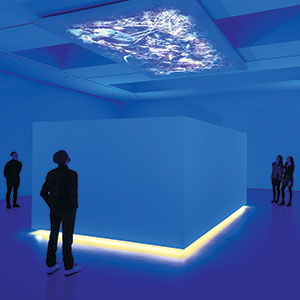

The lowly Scarabaeus viettei—better known as the dung beetle—doesn’t exactly scream high art. It spends its days bumbling about clumsily, pushing around balls of excrement (its food of choice). And while it is capable of flying, and certainly looks like some kind of alien life form, what could it possibly have to do with the outer reaches of our galaxy?
Well… more than you might expect, actually. As Los Angeles-based artist Diana Thater learned while researching the insect, dung beetles use the white stripe of the Milky Way to navigate and orient themselves at night.
And so, when the San Jose Museum of Art commissioned the internationally known video and installation artist to create an exhibition for its ongoing Beta Space series, she chose the dung beetle as her muse.
“Beta Space: Diana Thater” will be on view in the museum’s skylight gallery from March 13 until Sept. 13. The exhibition is part video, part installation and will feature images of the dung beetle hard at work, projected overhead. Thater will participate in a discussion about her art on April 23 at 7pm at the museum.
The austere, white gallery will be lit a blue/green hue, and a large white box in the center of the gallery will emit a soft yellow light. The idea, Thater says, is to replicate the nocturnal environment of the dung beetle. An adjacent gallery will display animated footage of the Milky Way.
“The intention is to link the museum to NASA and other science and high-tech corporations in the area,” Thater says. The piece also gives her the opportunity to explore “the micro and the macro”—as seen in the juxtaposition of the beetle’s tiny world against the expansiveness of outer space.
Thater holds degrees in art from New York University and the Art Center College of Design in Pasadena—where she currently serves as chair of the art department—and says she was “always interested in moving images and art history.” She admits to being strongly influenced by the Light and Space artists who worked out of Los Angeles in the 1960s and especially the work of Robert Irwin. “We all have similar concerns with phenomena (natural environment, color and light) but my work uses imagery.”
A fan of nature documentaries, Thater has created previous installations about dolphins, gorillas and wolves. She is not, however, interested in telling a narrative story, because “animals and nature don’t tell a story from beginning to end.” By using nonlinear time, the artist feels that her work is a kind of abstraction and redefines what installation art can be.
Mar 13-Sep 13, Tue-Sun: 11am-5pm, $5-$8


